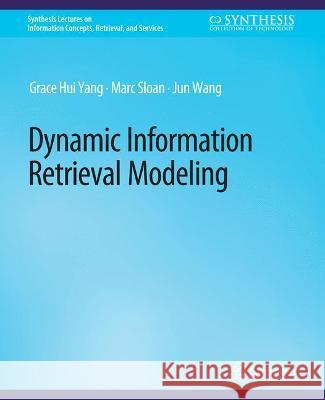Dynamic Information Retrieval Modeling » książka
Dynamic Information Retrieval Modeling
ISBN-13: 9783031011733 / Angielski / Miękka / 2016 / 148 str.
Big data and human-computer information retrieval (HCIR) are changing IR. They capture the dynamic changes in the data and dynamic interactions of users with IR systems. A dynamic system is one which changes or adapts over time or a sequence of events. Many modern IR systems and data exhibit these characteristics which are largely ignored by conventional techniques. What is missing is an ability for the model to change over time and be responsive to stimulus. Documents, relevance, users and tasks all exhibit dynamic behavior that is captured in data sets typically collected over long time spans and models need to respond to these changes. Additionally, the size of modern datasets enforces limits on the amount of learning a system can achieve. Further to this, advances in IR interface, personalization and ad display demand models that can react to users in real time and in an intelligent, contextual way. In this book we provide a comprehensive and up-to-date introduction to Dynamic Information Retrieval Modeling, the statistical modeling of IR systems that can adapt to change. We define dynamics, what it means within the context of IR and highlight examples of problems where dynamics play an important role. We cover techniques ranging from classic relevance feedback to the latest applications of partially observable Markov decision processes (POMDPs) and a handful of useful algorithms and tools for solving IR problems incorporating dynamics. The theoretical component is based around the Markov Decision Process (MDP), a mathematical framework taken from the field of Artificial Intelligence (AI) that enables us to construct models that change according to sequential inputs. We define the framework and the algorithms commonly used to optimize over it and generalize it to the case where the inputs aren't reliable. We explore the topic of reinforcement learning more broadly and introduce another tool known as a Multi-Armed Bandit which is useful for cases where exploring model parameters is beneficial. Following this we introduce theories and algorithms which can be used to incorporate dynamics into an IR model before presenting an array of state-of-the-art research that already does, such as in the areas of session search and online advertising. Change is at the heart of modern Information Retrieval systems and this book will help equip the reader with the tools and knowledge needed to understand Dynamic Information Retrieval Modeling.











